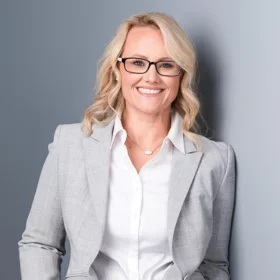Strategic Communication lecturer Khalid Azim’s life and experiences in the Navy, in the financial sector, and as a White House Fellow have been shaped by his deep ties to Columbia and by the University’s commitment to academic excellence and opportunity. He currently teaches Leadership and Communication in the School of Professional Studies’ M.S. in Strategic Communication program. Azim’s course combines academic theory with practical application, and he uses real-world examples and class exercises to bring concepts to life.
Azim’s connection to Columbia began with his father, who came from India to pursue a Ph.D. there in linguistics.
“My father came to this country as a young man, found by Columbia scholars who identified his brilliance and sponsored him. Columbia transformed his life and, by extension, mine,” Azim says. “Columbia is part of my DNA.”
Azim says he practically grew up on Columbia’s campus, playing on the lawn in front of Butler Library and attending the Cathedral School at St. John the Divine in Morningside Heights. His older brother went to Columbia Engineering, and his two sons now carry on the tradition, with one having graduated from Columbia College and the other a junior at Columbia Engineering.
Although he’s not an alum himself, Azim maintains his own ties to the University. He spent eight and a half years working at Columbia Business School before he joined the School of Professional Studies’ M.S. in Strategic Communication program.
His upbringing directly influences his teaching philosophy. Azim’s father, who felt it was his responsibility to give back, instilled in him the importance of teaching and mentoring. “I grew up in an academic family where teaching was considered a really important thing to do. I’ve always enjoyed mentoring and coaching, especially younger people,” he explains.
Helping students experience “light bulb” moments is the most gratifying part of teaching for Azim. Seeing a young person’s potential and capabilities, helping them think about problems in a broader way, and then witnessing their growth is a process he finds extremely rewarding. His approach to teaching is about guiding students to find their own answers.
“It’s not about being prescriptive but about helping students construct the inputs they need to set the equation for their own outcomes,” he says.
In his classroom, Azim emphasizes the importance of strategic communication in today’s world, where human connections and effective communication are paramount. He believes that while technical skills and data analysis are crucial, the ability to convey outcomes, visions, and strategies is equally vital. He stresses the need for students to have strong communication skills to avoid misunderstandings and conflicts, whether between individuals, organizations, or nations.
His Navy background plays a significant role in his teaching and professional life. Serving as the only nonwhite officer on his nuclear-powered submarine, Azim learned valuable lessons about leadership, competency, and integrity. “The Navy gave me confidence, a sense of purpose, and a sense of belonging,” he reflects. “What mattered was proficiency and character, not what you looked like.”
His military experience taught him the value of diversity and the importance of supporting and relying on one another. It instilled in him a sense of discipline and leadership that he still carries into everything he does.
After the Navy, Azim was selected to be a White House Fellow. As special assistant to the chairman of the Export-Import Bank of the United States (EXIM), he gained firsthand exposure to government and policy-making at the highest levels. Azim eventually transitioned into the business world when he joined Morgan Stanley as a managing director, a role in which he developed a keen understanding of the fast-paced financial sector. His ability to adapt, take initiative, and build expertise made him successful in the corporate world, and he is now the president of ABANA, a U.S. organization for finance professionals and institutions with an interest in the Middle East and North Africa.
These experiences all shaped Azim’s perspective and teaching approach, making him a unique and valuable asset to the Columbia community. His journey of personal growth, professional excellence, and unwavering dedication to the values of education and community continues to inspire and shape the lives of students.
His advice to students is to embrace all that the Columbia experience offers. “Your education is not just in the classroom,” he says. “It’s the whole experience of being there, the relationships you build, the network you create, and the intellectual challenges you face.”
About the Program
The business world’s around-the-clock communications challenges are demanding a new level of strategic thinking. Columbia University’s Master of Science in Strategic Communication graduates emerge equipped with all the essential skills and tools for a successful career in a wide range of communication fields.


